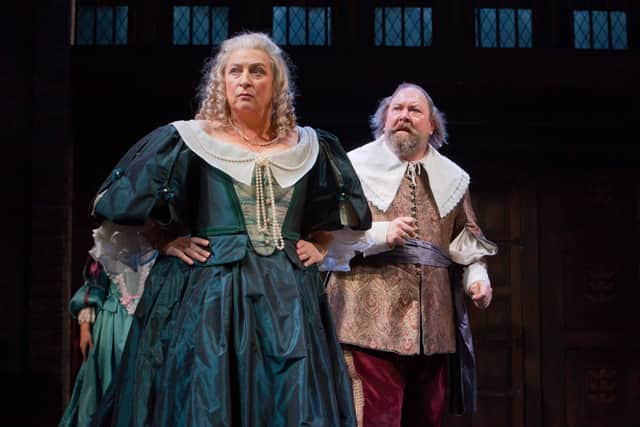Hull Truck Theatre bosses ‘bowled over by overwhelming support’


When we decided at The Yorkshire Post that during the lockdown I would bring you weekly profiles of our region’s theatres, I’ll admit that there were some theatres whose story I was particularly excited to share.
All of our theatres, where we gather to hear stories, have wonderful histories of their own, but not all of them have a story that begins in the back of a van.
Advertisement
Hide AdAdvertisement
Hide AdIn 1971 a, let’s call him, a maverick, was living deliberately out of the limelight.


Mike Bradwell, who would go on to become artistic director at The Bush in London, was then living in Hull, the place he set up Hull Truck Theatre. In 2013, when I interviewed him for The Yorkshire Post, he told me: “Nobody could keep an eye on us up there. We were on the dole, making our work and there were no jobs up in Hull, so we knew if we moved there, they wouldn’t be able to find us any work.”
So off to Hull he went. He placed an advert in Time Out that read: “Half formed theatre company seeks other half.” Hull Truck was born – named, with admirable logic, after the mode of transport it travelled in to perform its shows.
The company grew over the decade Bradwell ran it, moving to a former church on Spring Street, and then in 1982 a significant new character emerged to entwine his own personal history with that of the theatre’s; John Godber. The Godber era brought with it success stories like Up N Under, Bouncers, Teechers; which was fortunate given that when he became artistic director in 1984, beating Danny Boyle to the role, the company was financially in a serious hole.
Advertisement
Hide AdAdvertisement
Hide AdIn 2006, work began on a £15m new building on Ferensway, opening in 2009. The move to the new building should have marked the start of a hugely successful new era, but instead marked a frankly bizarre chapter which is far too complicated to explain here, but led to Godber severing ties with the organisation, the artistic director Gareth Tudor Price being made redundant and not replaced, and a chief executive who was followed into the organisation by an industry troubleshooter.
The man brought in to steady the ship in 2013 was former Bolton Octagon artistic director Mark Babych. He has overseen a fascinating new era which has witnessed the theatre really embed itself into the city. It feels like it belongs to Hull perhaps more than any other time I’ve witnessed.
Babych says: “Our theatre prides itself on its engagement with people. Without the multiplicity of voices that we connect with through our theatre, it would not be the vibrant and welcoming organisation it is. Our theatre is more than just a space to see something, it’s a place of connection and a welcoming and safe space that anyone can access.”
This is the biggest change I’ve seen at Hull Truck. It was always a place to see shows, but Babych has turned it – over a period of several years – to face in a different direction. “We are driven by our core values of inclusion, integrity and innovation, values which the entire team passionately believe in. They are our guiding principles.”
Advertisement
Hide AdAdvertisement
Hide AdWhen Babych arrived I remember he was nervous, but also open to talking about the maelstrom in which he had found himself. Having reported on the previous few years for The Yorkshire Post, it was obvious to me that Babych was going to have a job on his hands.
“When I applied for the role of artistic director the company had gone through an extremely turbulent time. It was one of the most challenging things I had ever faced, but ultimately I really believed that the extraordinary roll call of artists that had been part of its incredible history, and the affection people had for this company and its place in the identity of this fantastic city, meant it absolutely must not be allowed to go under,” he says.
Babych credits the team for getting the organisation through, but as the ship’s captain it was he who had to set the course.
During 2017 Hull was City of Culture, bringing an incredible explosion of creativity and cultural pride to the East Riding. It also brought the Royal Shakespeare Company to Hull Truck, with Hullensian writer Richard Bean’s The Hypocrite on stage.
Advertisement
Hide AdAdvertisement
Hide Ad“That production showed how far we’d come as an organisation in such a short space of time,” says Babych. “Productions like The Gaul by Janet Plater and The Last Testament of Lillian Bilocca by Maxine Peake showed how much our theatre can reflect the voice of a community and The Culture by James Graham was pure knockabout celebration.”
A time of pure celebration now feels like a lifetime ago. Will theatres be the same at the end of this?
“When artists come to work with us and audiences visit us, we show them a different perspective of who we are and what we are. We need spaces like theatres where we can confidently congregate to enjoy different perspectives of the world around us, to develop deeper empathy and understanding of each other. It’s important that we hold onto these things,” says Babych.
“My feeling is that when this is over we will need to remobilise people to feel confident again in public spaces and we can’t expect this to suddenly happen.
Advertisement
Hide AdAdvertisement
Hide Ad“I have been bowled over by the overwhelming support we have been given. We will emerge from this with kindness, something I know our team have in abundance and I’m so proud of them.”
This venue is going to keep on trucking.
Significant productions at Hull Truck
Bouncers: Its premiere was in front of a drunk and a critic at the 1977 Edinburgh Fringe and it was one of the shows John Godber brought with him to reverse the financial fortunes of the theatre.
Confessions of a City Supporter: In 2004 TV writing titan Alan Plater pledged his undying love for his home city with this comedy – a perfect example of how the heart never leaves this city and its theatre.
Up On Roof: Richard Bean, before he was The Richard Bean, was a proud former Hullensian and this 2006 comedy showed sparks of what was to come.
Advertisement
Hide AdAdvertisement
Hide AdEditor’s note: first and foremost - and rarely have I written down these words with more sincerity - I hope this finds you well.
Almost certainly you are here because you value the quality and the integrity of the journalism produced by The Yorkshire Post’s journalists - almost all of which live alongside you in Yorkshire, spending the wages they earn with Yorkshire businesses - who last year took this title to the industry watchdog’s Most Trusted Newspaper in Britain accolade.
And that is why I must make an urgent request of you: as advertising revenue declines, your support becomes evermore crucial to the maintenance of the journalistic standards expected of The Yorkshire Post. If you can, safely, please buy a paper or take up a subscription. We want to continue to make you proud of Yorkshire’s National Newspaper but we are going to need your help.
Postal subscription copies can be ordered by calling 0330 4030066 or by emailing [email protected]. Vouchers, to be exchanged at retail sales outlets - our newsagents need you, too - can be subscribed to by contacting subscriptions on 0330 1235950 or by visiting www.localsubsplus.co.uk where you should select The Yorkshire Post from the list of titles available.
Advertisement
Hide AdAdvertisement
Hide AdIf you want to help right now, download our tablet app from the App / Play Stores. Every contribution you make helps to provide this county with the best regional journalism in the country.
Sincerely. Thank you.
James Mitchinson
Editor